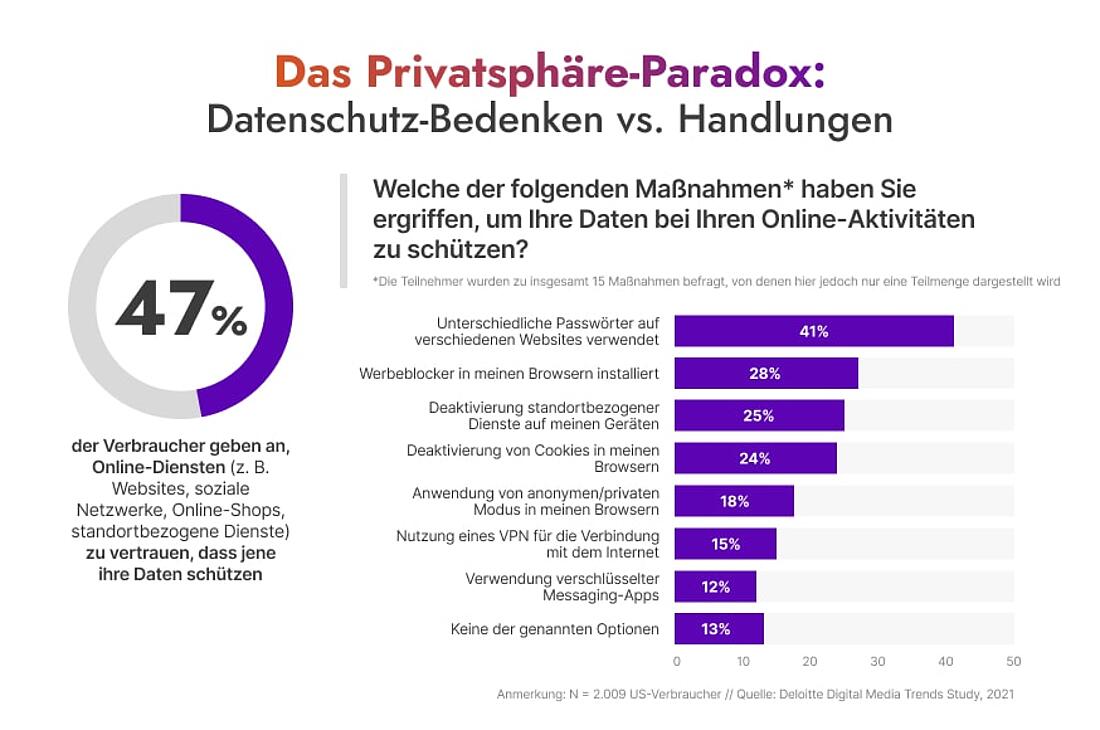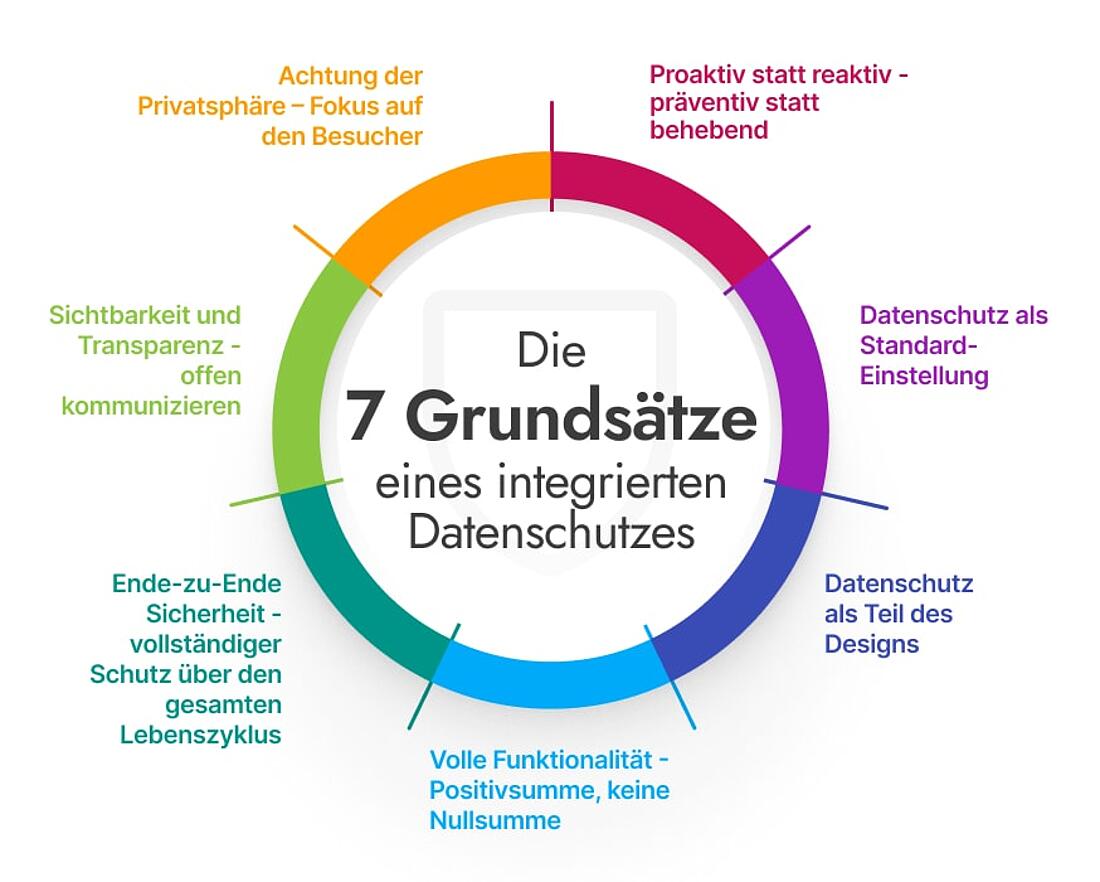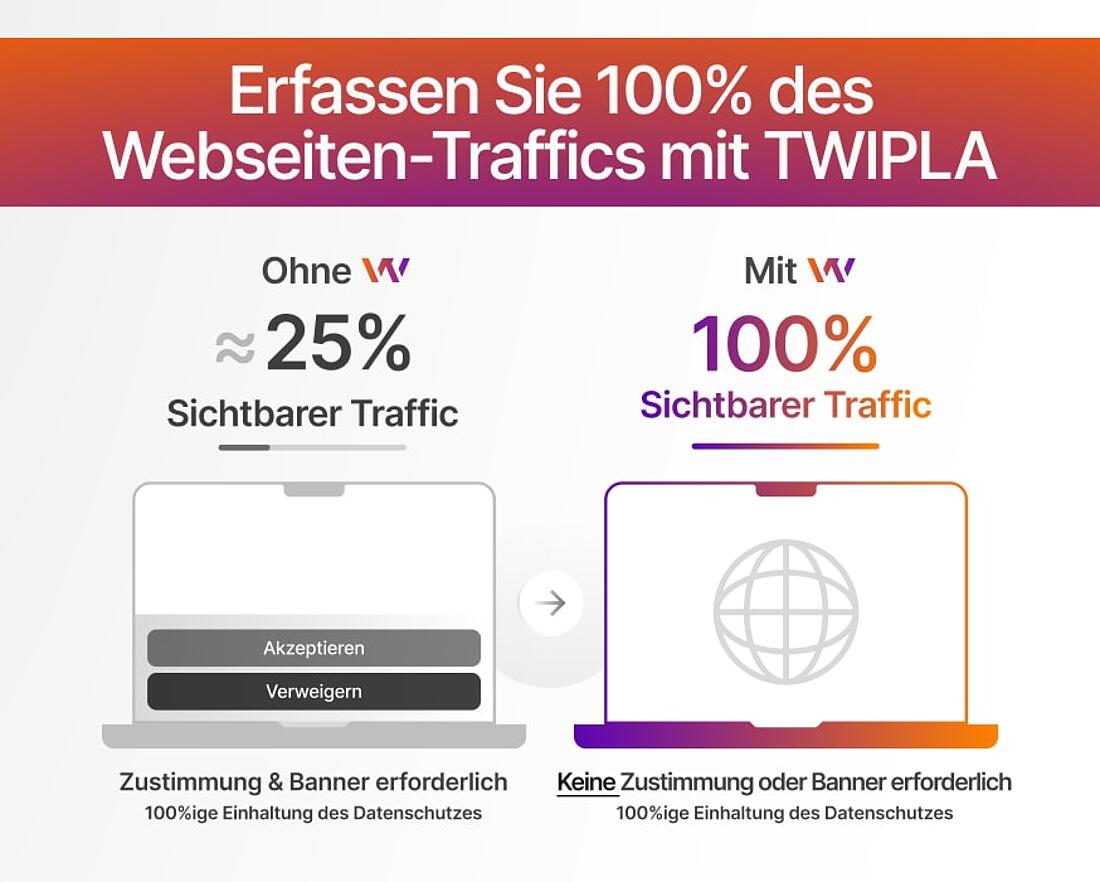- Warum wir?
- Funktionen
White Label
Für SaaS-Anbieter & Agenturen
Stellen Sie Ihren Kunden unsere komplette Analytics-Suite zur Verfügung, direkt in Ihrer eigenen Benutzeroberfläche und mit Ihrem eigenen Branding. Entdecken Sie Analytics-as-a-Service und White Label Analytics. Großer Nutzen, minimaler Aufwand.
- Preise
- White Label
- Erfolgsgeschichten
- RessourcenWissensdatenbankErste Schritte
- Kleine Unternehmen
- Digital-Vermarkter
- Webseiten-Analysten
- Unternehmen, Agenturen und SaaS
- Webseiten-Statistiken
- Verhaltensanalyse
- Besucherkommunikation
- DSGVO & Datenschutzgesetze
- Webseiten-Intelligenz
- Digital-Marketing
- Produkt-Aktualisierungen
- Unternehmens-Neuigkeiten
- Newsletter
- Leitfäden
- E-Commerce
INHALT
- The Privacy Paradox
- Wie soziale Medien das Datenschutzparadoxon anheizen
- Das Paradoxon von Personalisierung und Datenschutz
- Das Datenschutzparadoxon bei KI
- Wie das Paradoxon des Datenschutzes gelöst werden kann
- Das Datenschutzparadoxon in der Analytik
- FAQs zum Datenschutzparadoxon
- Was ist das Datenschutzparadoxon?
- Existiert das Datenschutz-Paradoxon?
- Was ist das Paradoxon zwischen Datenschutz und Personalisierung?
Das Datenschutz-Paradoxon: Zwischen Vertrauen und Besorgnis

"In Umfragen äußern sich die Verbraucher sehr besorgt über ihre Privatsphäre im Internet. Gleichzeitig ergreifen aber nur sehr wenige Maßnahmen zum Schutz der Privatsphäre.
- Leslie Harris, Geschäftsführerin des Zentrums für Demokratie und Technologie.
Dieser Widerspruch zwischen Worten und Taten ist faszinierend und bildet die Grundlage für das so genannte Datenschutzparadoxon.
Dieser Blog befasst sich mit den Faktoren, die zu dieser Anomalie führen, mit einigen Beispielen für das Datenschutzparadoxon wie den sozialen Medien und der Personalisierung sowie mit den Problemen, die durch neue Technologien entstehen.
Außerdem wird er sich damit befassen, wie Unternehmen das Datenschutzparadoxon für die Nutzer entschärfen können, und wie Datenschutz in der Analytik nicht weniger Daten bedeuten muss.
The Privacy Paradox
→ Why We Say We Care About Privacy But Give It Away So Freely
Here's the Privacy Paradox definition:
It refers to a puzzling behavior in which individuals express genuine concern about data privacy online, yet often take actions that undermine their own privacy.
It's strange, like seeing a doctor smoking outside a respiratory ward.
Despite growing awareness of the risks of data breaches and mass government surveillance, many people continue to naively approach the internet as if it were some idyllic safe space - a digital Canada.
They freely overshare their information, mechanically accept cookie pop-ups, and sign up for services known to track their online activities.
This raises an important question: if we care so much about our privacy, then why do we keep giving it away in the first place?
One reason is obvious - the convenience of online services.
Social media and personalized recommendations rely on data collection, and many will prioritize these benefits over protecting their information.
Furthermore, privacy policies can be difficult for people to understand. Many don’t really know what cookies and tracking even are, but will click “accept” without trying to understand the implications of what they are consenting to.
Another reason is the perception that their online privacy is already compromised.
Data breaches make daily headlines, and with so much data already exposed, many feel it pointless to take extra precautions.
While there may be some truth to this, the sense of inevitability and futility drives behaviors that ultimately put them at greater risk.
Despite this disconnect, the conversation about privacy is evolving.
Increased awareness of data ethics and emerging regulations may encourage users and companies to prioritize privacy, bridging the gap between valuing privacy and protecting it in practice.
But for now, the Privacy Paradox serves as a reminder of the ongoing struggle to protect user data rights - even from themselves.
Wie soziale Medien das Datenschutzparadoxon anheizen
Soziale Medien spielen im Online-Leben vieler Menschen eine zentrale Rolle - entweder nutzen sie eine dieser Plattformen oder diskutieren häufig, warum sie es nicht tun.
Unternehmen wie Facebook, X (Twitter) und TikTok eignen sich hervorragend als Beispiele für ein Datenschutzparadoxon, da sie ihre Nutzer dazu ermutigen, persönliche Informationen zu teilen, während sie die damit verbundenen Datenschutzrisiken oft herunterspielen.
Diese Plattformen leben von nutzergenerierten Inhalten und drängen die Menschen dazu, ihre Gedanken, Fotos und Erfahrungen offen zu teilen. Dies entspricht unserem inhärenten Wunsch nach sozialer Verbundenheit und Bestätigung durch Gleichaltrige, wirft aber auch Fragen zur Ethik der sozialen Medien und zum Datenschutzparadox auf.
Darüber hinaus sammeln Social-Media-Unternehmen riesige Mengen an Nutzerdaten aus diesen Uploads und nutzen sie, um gezielte Werbung und personalisierte Erlebnisse anzubieten. Die Nutzer freuen sich zwar über maßgeschneiderte Inhalte, sind sich aber möglicherweise nicht der umfangreichen Datenerfassung bewusst, die für ein solches Maß an Personalisierung erforderlich ist.
Dies ist letztlich das Datenschutzparadoxon, das die sozialen Medien schaffen.
Außerdem kann das schnelle Tempo der Online-Interaktionen zu impulsivem Teilen führen, ohne die langfristigen Auswirkungen auf den Datenschutz zu bedenken. Menschen laden oft Bilder ihrer Kreditkarten hoch, geben ihre Privatadressen weiter und kündigen an, wann sie in den Urlaub fahren, und verletzen sich damit ungewollt auf gefährliche Weise.
Die sozialen Medien werden in absehbarer Zeit nicht verschwinden, und die Nutzer müssen sich aktiv um das richtige Gleichgewicht zwischen Engagement und Datenschutz bemühen - und dabei akzeptieren, dass die sozialen Medien ungeachtet ihrer Bemühungen die Diskrepanz zwischen der Priorität des Datenschutzes und den Handlungen, die ihn gefährden, weiter verschärfen werden.
Das Paradoxon von Personalisierung und Datenschutz
→ Opfern wir zu viel, um die von uns erwartete UX zu erhalten?
Das Datenschutzparadoxon der Personalisierung ist eine Untergruppe des umfassenderen Datenschutzparadoxons, das besondere Aufmerksamkeit verdient.
Es verdeutlicht den Zielkonflikt zwischen dem Wunsch nach personalisierten Online-Erlebnissen und dem Unbehagen an der Datenerfassung.
Personalisierung ist heute allgegenwärtig, von Netflix' In-App-Filmempfehlungen über Facebooks maßgeschneiderte Newsfeeds bis hin zum maßgeschneiderten E-Mail-Marketing von Unternehmen, die Sie abonniert haben.
Diese Dinge verbessern das Kundenerlebnis, aber sie funktionieren nur, wenn die Menschen bereit sind, ihre Privatsphäre zu opfern, indem sie mehr Informationen preisgeben, als ihnen lieb ist.
Dies wirft kritische Fragen darüber auf, wie viele persönliche Informationen die Nutzer bereit sind zu opfern.
Da Datenschutzverletzungen und Informationsmissbrauch immer häufiger vorkommen und gestohlene persönliche Daten das Dark Web überschwemmen, müssen die Nutzer ihr Engagement für personalisierte Dienste überdenken.
Es ist wichtig, ein Gleichgewicht zwischen maßgeschneiderten Erlebnissen und dem Schutz persönlicher Daten zu finden. Eine stärkere Sensibilisierung für die Datenschutzrechte und die Umsetzung solider Datenschutzpraktiken durch die Unternehmen sind entscheidend, um sich in dieser komplexen Landschaft zurechtzufinden und sicherzustellen, dass die Nutzer nicht unwissentlich zu viele Opfer im Namen der Personalisierung bringen.
Das Datenschutzparadoxon bei KI
Das Datenschutzparadoxon hat sich mit dem Aufkommen der künstlichen Intelligenz (KI) noch weiter verschärft.
Während diese Technologien mehr Komfort, Effizienz und personalisierte Erlebnisse versprechen, wirft KI erhebliche Bedenken hinsichtlich personenbezogener Daten auf.
Von Chatbots bis hin zu Empfehlungsalgorithmen benötigen KI-Systeme große Mengen an persönlichen Daten, um effektiv zu funktionieren, was dazu führen kann, dass Nutzer ihre Privatsphäre für die vermeintlichen Vorteile aufs Spiel setzen.
Mit der weiteren Entwicklung der KI und ihrer Fähigkeit, das Nutzerverhalten zu analysieren und vorherzusagen, können die Grenzen zwischen Personalisierung und Verletzung der Privatsphäre weiter verschwimmen.
Dies unterstreicht das Paradoxon von Wissenschaftlichkeit und Datenschutz.
Letztlich verstehen die Menschen nicht ganz, wie ihre Daten verwendet werden, und das führt dazu, dass viele ungewollt ihr Recht auf Privatsphäre aufgeben. Darüber hinaus macht es die Komplexität von KI-Systemen den Nutzern schwer, die Auswirkungen der Weitergabe ihrer Daten zu verstehen.
Die Lösung des Datenschutzparadoxons im Zusammenhang mit KI erfordert eine sorgfältige Abwägung zwischen der Nutzung der Leistungsfähigkeit dieser Instrumente und dem Schutz der Rechte des Einzelnen. Mehr Transparenz seitens der Unternehmen in Bezug auf die Datennutzung und solide rechtliche Rahmenbedingungen können ebenfalls dazu beitragen, die mit KI verbundenen Risiken zu mindern.
Und da sich die Verbraucher dieser Problematik immer stärker bewusst werden, ist es für Unternehmen unerlässlich, ethischen Datenpraktiken Priorität einzuräumen und sicherzustellen, dass die Vorteile der KI nicht auf Kosten der Privatsphäre der Nutzer gehen.
Wie das Paradoxon des Datenschutzes gelöst werden kann
→ Fokus auf den Aufbau von Nutzervertrauen
Während die Internetnutzer sich selbst besser über die Auswirkungen ihrer Online-Aktivitäten auf die Privatsphäre informieren müssen, sollten die Unternehmen daran arbeiten, Vertrauen bei ihnen aufzubauen.
In der Praxis bedeutet dies, dass Transparenz bei den Datenpraktiken Vorrang hat und klar kommuniziert wird, wie personenbezogene Daten erhoben, gespeichert und verwendet werden.
Es bedeutet, die Datenschutzrichtlinien zu vereinfachen und Fachjargon so weit wie möglich zu vermeiden, damit die Nutzer in die Lage versetzt werden, fundierte Entscheidungen über ihre Daten zu treffen.
Das Vertrauen der Nutzer kann auch durch die Anwendung der Grundsätze des "Privacy-by-Design" gestärkt werden.
Dazu gehört, dass in jeder Phase der Produktentwicklung ein solider Schutz der Privatsphäre eingebaut wird, der sicherstellt, dass Datenminimierung und Sicherheit grundlegende Überlegungen sind.
Unternehmen können den Nutzern auch eine größere Kontrolle über ihre Daten durch anpassbare Datenschutzeinstellungen bieten, so dass sie selbst entscheiden können, welche Informationen sie weitergeben möchten.
Die Einbeziehung der Nutzer durch Aufklärung über die Rechte der Privatsphäre und die Bedeutung des Datenschutzes kann das Vertrauen weiter stärken. Unternehmen sollten Ressourcen bereitstellen, die den Nutzern helfen, die Risiken und Vorteile der Weitergabe ihrer Daten in einer digitalen Umgebung zu verstehen.
Schließlich ist die Förderung einer Kultur der Verantwortlichkeit innerhalb von Organisationen von entscheidender Bedeutung. Das Engagement für ethische Datenpraktiken und die rasche Reaktion auf Datenschutzverletzungen können den Nutzern die Gewissheit geben, dass ihre Privatsphäre ernst genommen wird.
Indem sie Vertrauen und Transparenz in den Vordergrund stellen, können Unternehmen das Datenschutzparadoxon wirksam entschärfen, was zu einem verantwortungsvolleren Datenaustausch und besseren Kundenbeziehungen führt.
Das Datenschutzparadoxon in der Analytik
→ Erfüllung von Compliance-Anforderungen bei gleichzeitiger Erfassung von mehr Website-Besucherdaten
Wenn es um die Analyse von Websites geht, besteht die Herausforderung darin, gleichzeitig die Datenschutzbestimmungen einzuhalten und die Datenerfassung zu maximieren, um genaue Einblicke und Optimierungshinweise zu gewährleisten.
Viele Unternehmen gehen davon aus, dass die strikte Einhaltung von Vorschriften wie GDPR und ePrivacy den Verzicht auf wertvolle Nutzerdaten erfordert. TWIPLA zeigt jedoch, dass es möglich ist, die Datenschutzgesetze einzuhalten und gleichzeitig mehr Daten zu sammeln.
Durch die fortschrittliche kochfreie Tracking-Technologie können Kunden Analysen nutzen, ohne die Zustimmung der Website-Besucher einzuholen. Dieser innovative Ansatz macht Cookie-Banner überflüssig und ermöglicht es Besuchern, die sich sonst durch die Ablehnung von Einwilligungsbannern unsichtbar machen würden, zu sichtbaren Datenpunkten zu werden.
Das Ergebnis: TWIPLA erhöht die Datenerfassung um bis zu 500 % und bietet Unternehmen tiefere Einblicke in das Nutzerverhalten und -engagement. Darüber hinaus bietet TWIPLA drei niedrigschwellige Datenschutzmodi, die eine Zustimmung erfordern und es Unternehmen ermöglichen, die Datenschutzeinstellungen je nach Herkunftsland des Besuchers anzupassen.
Wichtig ist, dass TWIPLA ein in das Zustimmungsbanner integriertes duales Tracking-Code-System einsetzt, das es Unternehmen ermöglicht, wichtige Daten von Besuchern zu sammeln, die das Tracking in den niedrigeren Datenschutzmodi ablehnen, indem sie automatisch zur Logik des maximalen Datenschutzmodus zurückkehren.
Dieser innovative Ansatz verbessert nicht nur die Datenerfassung, sondern versetzt Unternehmen auch in die Lage, die Privatsphäre der Nutzer zu respektieren und letztlich die Kluft zwischen Datenschutzbedenken und dem Bedarf an verwertbaren Erkenntnissen zu überbrücken.
Was ist das Datenschutzparadoxon?
Das Datenschutz-Paradoxon ist der Widerspruch zwischen den Bedenken, die die Menschen hinsichtlich des Schutzes ihrer Daten im Internet äußern, und ihrem tatsächlichen Verhalten, z. B. der übermäßigen Weitergabe von Informationen im Internet oder dem Ignorieren von Datenschutzrichtlinien aus Bequemlichkeit oder vermeintlicher Hilflosigkeit.
Existiert das Datenschutz-Paradoxon?
Ja, das Datenschutzparadoxon gibt es. Viele Studien zeigen, dass Menschen sich oft nicht so verhalten, wie sie es sollten, wenn ihnen der Schutz ihrer Online-Daten wirklich am Herzen läge, und häufig ihre persönlichen Daten preisgeben, obwohl sie ihre Besorgnis zum Ausdruck bringen.
Artikel teilen
Kostenlos einsteigen
Gewinnen Sie erstklassige Einblicke und bieten Sie innovativen Datenschutz und Sicherheit







